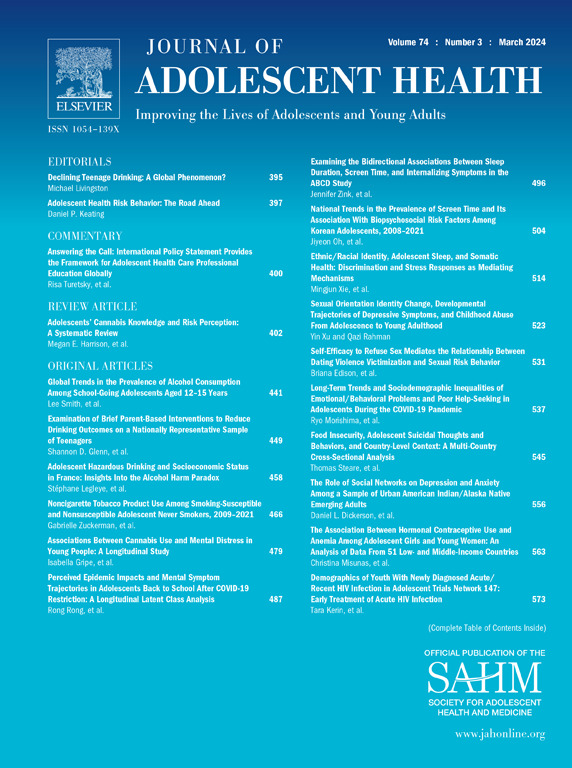Sexual and Reproductive Health and Rights
IF 5.5
2区 医学
Q1 PEDIATRICS
引用次数: 0
Abstract
Sexual and reproductive health is a fundamental human right for all people, including adolescents and young adults (AYAs). Sexual and reproductive health and rights (SRHR) encompasses the right to comprehensive, medically accurate, and evidence-based sexual health information and healthcare services, as well as the ability to understand and exercise these rights. SRHR are essential to AYA’s emotional, cognitive, and psychosocial development, physical and mental health, gender equality, and wider economic and social development. Access to sexual and reproductive health information and healthcare, inclusive of sexual orientation, gender identity, sexual behavior, and reproduction, is critical to achieving healthy sexual development. A strong body of research demonstrates that access to comprehensive, confidential sexual and reproductive health education and healthcare services, as well as family and community supports, improves a range of outcomes for AYAs. These favorable outcomes include delays in the age of sexual debut, reductions in sexual activity rates and the number of sexual partners, and increases in contraception and condom use. While there have been significant advancements in SRHR across the globe, AYAs continue to experience disproportionately higher rates of sexually transmitted infections, human immunodeficiency virus, unintended pregnancy, reproductive coercion, and sexual exploitation, as well as violence based on sex assigned at birth, sexual orientation, and gender identity. These disparities contribute to morbidity, mortality, and health inequities. Accordingly, the Society for Adolescent Health and Medicine adopts the following positions: (1) comprehensive sexual and reproductive health information and healthcare are fundamental human rights for all AYAs; (2) all AYAs should have universal access to comprehensive sexual and reproductive health information and healthcare; (3) all AYA-serving clinicians should have requisite knowledge and skills to provide sexual and reproductive health information and healthcare, and nonclinical AYA professionals should be an SRHR resource and provide referrals; and (4) increased investments in AYA-related sexual and reproductive health education, services, research, and advocacy, with meaningful stakeholder engagement, are needed to actualize SRHR for AYAs. Further, AYAs should have a voice in SRHR interventions and policies that affect their lives to ensure these efforts are relevant and meet their needs. Opportunities to advance the SRHR of AYAs exist at each level of the socioecological system.
性健康和生殖健康及权利。
性健康和生殖健康是包括青少年和青壮年在内的所有人的一项基本人权。性健康和生殖健康及权利包括获得全面、医学上准确和基于证据的性健康信息和保健服务的权利,以及理解和行使这些权利的能力。性别和性别歧视对亚洲人的情感、认知和社会心理发展、身心健康、性别平等以及更广泛的经济和社会发展至关重要。获得性健康和生殖健康信息和保健,包括性倾向、性别认同、性行为和生殖,对实现健康的性发展至关重要。大量研究表明,获得全面、保密的性健康和生殖健康教育和保健服务,以及家庭和社区的支持,可以改善辅助生殖服务的一系列成果。这些有利结果包括推迟初次性行为的年龄,性活动率和性伴侣数量的减少,以及避孕和避孕套使用的增加。虽然全球各地在性健康和生殖健康方面取得了重大进展,但在性传播感染、人类免疫缺陷病毒、意外怀孕、生殖强迫和性剥削以及基于出生性别、性取向和性别认同的暴力方面,未成年人社区的比例仍然高得不成比例。这些差异助长了发病率、死亡率和卫生不平等。因此,青少年健康和医学协会采取以下立场:(1)全面的性健康和生殖健康信息和保健是所有未成年人的基本人权;(2)所有aya都应普遍获得全面的性健康和生殖健康信息和保健;(3)所有AYA服务的临床医生应具备提供性健康和生殖健康信息和保健的必要知识和技能,非临床AYA专业人员应成为SRHR资源并提供转诊;(4)在有意义的利益攸关方参与的情况下,需要增加对与青年妇女有关的性健康和生殖健康教育、服务、研究和宣传的投资,以实现青年妇女的性健康和生殖健康。此外,在影响他们生活的性和性别人权干预措施和政策中,他们应该有发言权,以确保这些努力是相关的,并满足他们的需求。在社会生态系统的各个层面,都存在着提高农村区SRHR的机会。
本文章由计算机程序翻译,如有差异,请以英文原文为准。
求助全文
约1分钟内获得全文
求助全文
来源期刊

Journal of Adolescent Health
医学-公共卫生、环境卫生与职业卫生
CiteScore
10.40
自引率
3.90%
发文量
526
审稿时长
46 days
期刊介绍:
The Journal of Adolescent Health is a scientific publication dedicated to enhancing the health and well-being of adolescents and young adults. Our Journal covers a broad range of research topics, spanning from the basic biological and behavioral sciences to public health and policy. We welcome a variety of contributions, including original research papers, concise reports, literature reviews, clinical case reports, opinion pieces, and letters to the editor. We encourage professionals from diverse disciplines such as Anthropology, Education, Ethics, Global Health, Health Services Research, Law, Medicine, Mental and Behavioral Health, Nursing, Nutrition, Psychology, Public Health and Policy, Social Work, Sociology, and Youth Development to share their expertise and contribute to our mission of promoting adolescent health. Moreover, we value the voices of young individuals, family and community members, and healthcare professionals, and encourage them to submit poetry, personal narratives, images, and other creative works that provide unique insights into the experiences of adolescents and young adults. By combining scientific peer-reviewed research with creative expressions, our Journal aims to create a comprehensive understanding of the challenges and opportunities in adolescent and young adult health.
 求助内容:
求助内容: 应助结果提醒方式:
应助结果提醒方式:


